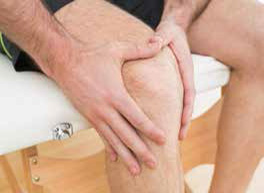
While no one wants a knee injury, of course, a torn medial collateral ligament (MCL) is probably the easiest knee injury to treat. MCLs will often heal on their own, meaning that a full return to normal activities without surgery is possible, even when dealing with the most severe tears. Often, a course of physical therapy can hasten your recovery and ensure a timely return to activity.
Located on the inside of your knee, the MCL attaches the thighbone to the lower leg bone and keeps your knee from turning inward. It can be injured easily when you perform activities that require sudden changes in direction or quick twists and turns—types of movements common in sports such as skiing or soccer, for example.
The good news is that, unlike other common knee injuries, MCLs are known for their ability to heal themselves. A torn anterior cruciate ligament, for example, usually necessitates surgery followed by a lengthy rehabilitation. When the MCL is torn, a blood clot forms, setting in motion a natural repair process during which healing blood cells help redevelop the torn ligament.
The protocol for handling an MCL injury is determined by the severity of the tear:
- Grade 1 tears are considered minor. Treatment involves using crutches for a few days to a couple of weeks, along with rest and icing the knee at home.
- Grade 2 tears are a bit more serious. Treatment often involves wearing a hinged knee brace while limiting the amount of weight borne by your knee for a month or so.
- Grade 3 tears are the most severe, but even these do not usually require surgery. Treatment involves wearing a hinged brace for a few weeks while working with us to increase your range of motion and strengthen the tendons and muscles surrounding the injured MCL.
No matter how severe your MCL tear, we can design and implement a progressive therapy program that aids your body’s natural ability to heal the torn ligament. In most cases, we can get you back to normal activity in as little as three months.
